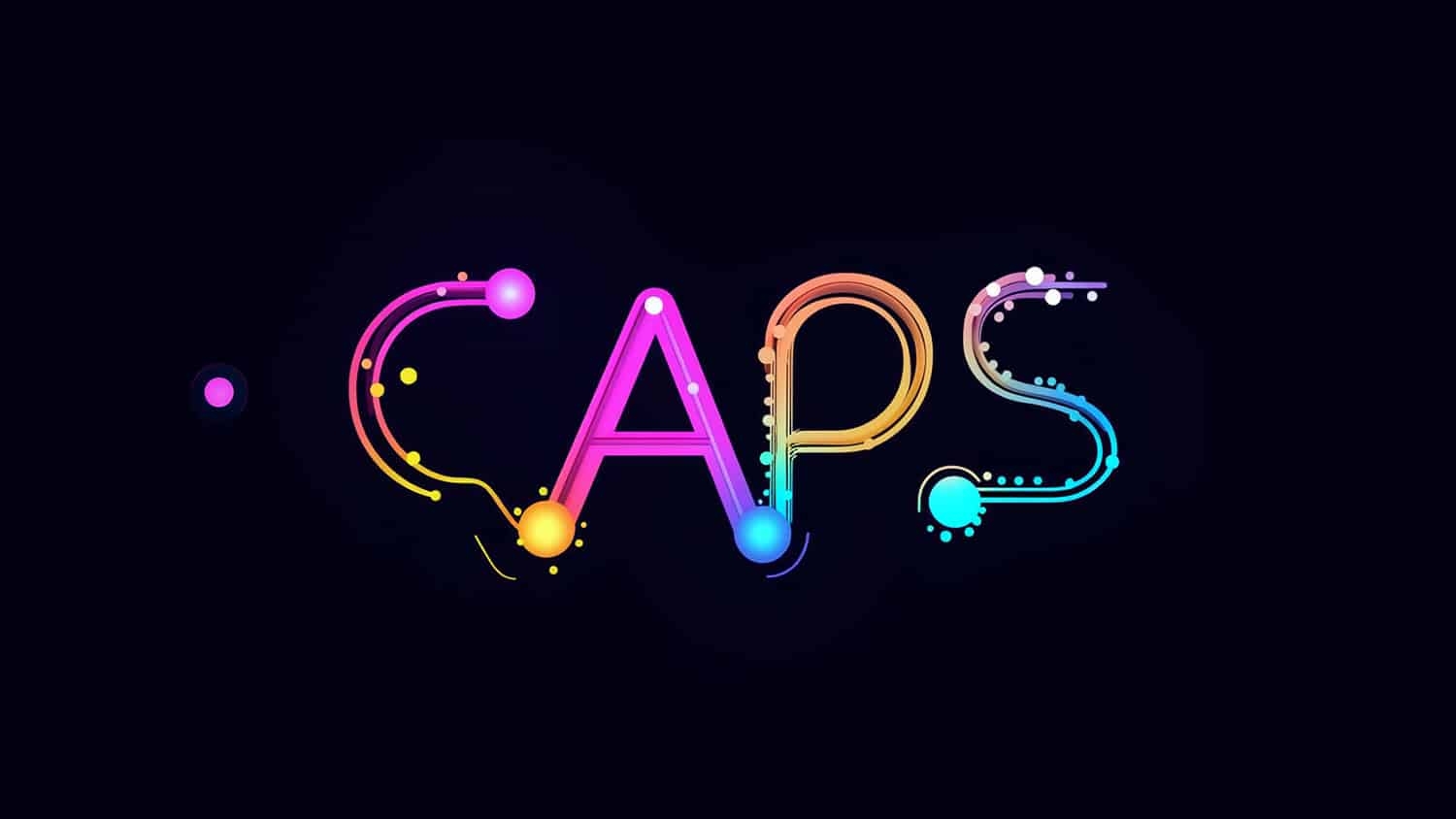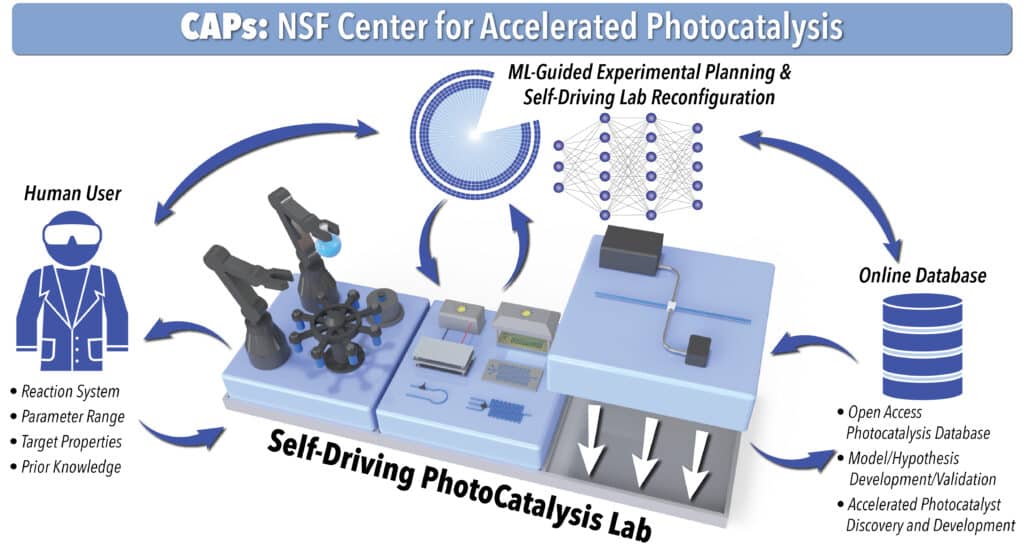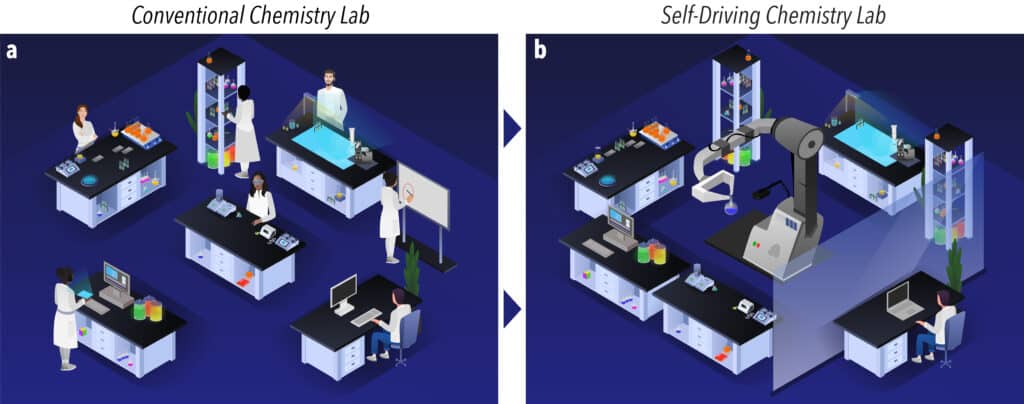NC State Receives NSF Grant to Establish the Center for Accelerated Photocatalysis

The National Science Foundation (NSF) announced that North Carolina State University will direct a center that deploys self-driving labs (SDLs) to accelerate discovery for reactions which use light as a catalyst in challenging chemical transformations. The NSF Center for Accelerated Photocatalysis (CAPs) is supported by an NSF Centers for Chemical Innovation (CCI) Program Phase I grant, totaling $1.8 million over the next three years.
Research and development undertaken by CAPs will enable access to sustainable, scalable, and more efficient chemical reaction pathways. Felix Castellano, a professor in NC State’s Department of Chemistry and Goodnight Innovation Distinguished Chair is the principal investigator and Director of CAPs, and Milad Abolhasani, an ALCOA professor in NC State’s Department of Chemical and Biomedical Engineering, is the associate director. Others involved in the project include Professor Gabriel dos Passos Gomes from Carnegie Mellon University, Professor Todd Hyster from Princeton University, Professor Tova Williams from NC State (Department of Textile Engineering, Chemistry and Science), and Professor Tehshik Yoon from the University of Wisconsin-Madison.
“The combination of self-driving laboratories with experimental planning guided by machine learning has the potential for augmenting human knowledge with insights that will accelerate discoveries,” said Gregory Collins, program director for the NSF Centers for Chemical Innovation program. “The focus of the new NSF Center for Accelerated Photocatalysis on discovering fundamentally new synthetic pathways using light-driven catalysts could enable important advancements that address long-standing challenges in this field.”

NC State currently leads several NSF-funded centers, including the ASSIST Center, the FREEDM Systems Center and the STEPS (Sciences and Technologies for Phosphorus Sustainability) Center.
“Despite the proven role of photochemistry in sustainability and pharmaceuticals, progress in this high-priority area has been slow due to labor-intensive, one-experiment-at-a-time approaches that present significant time and resource constraints,” said Castellano. “CAPs will fast-track fundamental studies of emerging photo(bio)catalysis in chemical synthesis and reaction discovery by implementing a robotic ‘co-pilot.’”
This ‘co-pilot’ will harness machine learning (ML) and robotic experimentation to augment human knowledge in photo(bio)catalysis. CAPs activities will include open-source reporting for all software and data generated, as well as a summer boot camp for high school students and teachers. The center will also emphasize engaging undergraduate and graduate students with physical disabilities in SDL experiments and developing short videos and science presentations for public events.
“I am excited to help coordinate outreach efforts that go beyond the university, engaging teachers and inspiring future scientists while also contributing to research efforts. Coupled with the fact that this program will empower individuals who might not typically engage in experimentation due to physical limitations, it will make science more inclusive and accessible, which is my jam!” said Williams, an assistant professor in the Textile Engineering, Chemistry & Science department at NC State.
Using unique multipurpose SDLs, CAPs will establish a game-changing research program to thoroughly comprehend and accelerate fundamental studies of emerging photo(bio)catalysis for small molecules.
NC State has long sat in the driver’s seat when it comes to SDLs and scientific innovation. SDLs integrate artificial intelligence (AI), lab automation and robotics to revolutionize experimental sciences and scientific research. NC State’s mission in this area is to establish universal SDL testbeds for the physical and life sciences as the foundation of future research and educational infrastructure.
Milad Abolhasani, ALCOA professor and University Faculty Scholar in the Department of Chemical and Biomolecular Engineering, has developed research and scholarship on SDLs for seven years.
“This NSF CCI Phase I Award will support the establishment of the foundations of a new research acceleration framework for photocatalysis using machine learning-assisted robotic experimentation (SDLs).” said Abolhasani, “We are very excited to start this cross-disciplinary project and explore how SDLs can accelerate the field of photocatalysis, further cementing NC State at the forefront of autonomous labs across the US.”
Earlier this year, NC State hosted the two-day Future Labs Workshop, designed to discuss the progress and future of SDLs. This workshop, along with the Center for Accelerated Photocatalysis, is one of several initiatives that showcase the university’s leadership and commitment to SDLs.

The Center for Accelerated Photocatalysis is also directly aligned with the research and educational goals of NC State’s Integrative Sciences Initiative (ISI) and Woodson Hall, which unite a dynamic community of interdisciplinary scholars committed to developing molecular solutions that address society’s most pressing human, animal and plant health challenges.
“This Phase I NSF CCI marks a significant milestone in establishing NC State as a global leader in accelerated reaction discovery and self-driving laboratories,” said Joshua Pierce, executive director of the Integrative Sciences Initiative. “As we advance the Integrative Sciences Initiative, this center will be a cornerstone of our vision, bolstered by substantial additional investments.”
The core focus areas of the ISI — molecular biomimicry, molecular metabolism, accelerative and predictive technologies, and inquiry-based education, workforce development, and public engagement — seek to foster the accelerated synthesis, analysis, and translation of novel molecules. The pursuit of innovation in these areas will be facilitated by world-class, cutting-edge technologies available within Woodson Hall, the future hub of ISI.
The scholarly strengths of the ISI and Woodson Hall are crucial in helping NC State build a national hub on both the physical and digital aspects of SDLs for various applications of accelerated technologies. In addition to the Center for Accelerated Photocatalysis bolstering this hub, in 2023, a research team from NC State was awarded a UNC System Research Opportunities Initiative (ROI) grant to accelerate molecular and biological innovations enabled by next-generation SDLs.
This post was originally published in NC State News.


